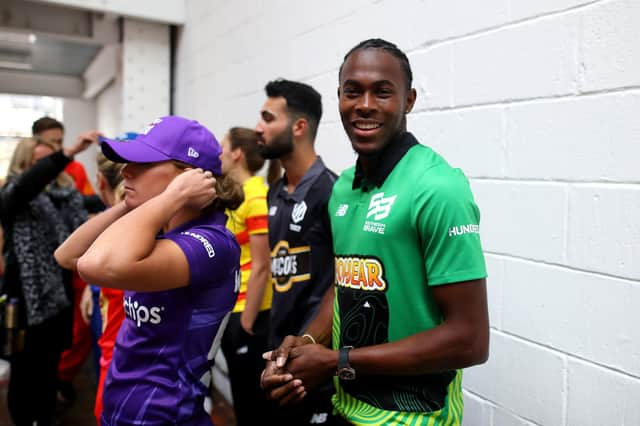ECB told to seek private equity investment for The Hundred to minimise financial impact of Covid-19


ECB chief executive Tom Harrison said last week the case for the controversial 100-ball competition is ‘even more important’ in the current climate but a board meeting today will discuss a 12-month postponement of the inaugural event.
If that were to happen, Oakwell Sports Advisory, a consultancy group, reasoned that additional launch costs would be required to ‘to reignite excitement’ in the same summer where football's European Championships and the Olympics are also taking place.
Advertisement
Hide AdAdvertisement
Hide AdUnder the terms of The Hundred, each county is to receive £1.3million per year from the eight-team tournament while host venues would get £65,000 per match, 30 per cent of ticket sales and hospitality revenues.
With The Ageas Bowl due to host four Southern Brave games, that would have netted Hampshire £260,000 alone - even before ticket sales and hospitality were added on.
Even for the counties that aren’t hosting a Hundred franchise - and there are 11 of them - the tournament is a ‘lifesaver.’
Ex-Leicestershire chief executive Wasim Khan, speaking last year, said the ECB had ’done brilliantly’ to secure a £1.2 billion broadcasting contract covering 2020-2024 for the 16.4-overs-a-side competition.
Advertisement
Hide AdAdvertisement
Hide Ad‘Cricket isn’t sustainable in this country, in terms of county cricket, so therefore this £1.3 million a year is a lifesaver,’ said Khan.
‘This is going to allow money for the counties to run more participation programmes and do more for the women’s and girls’ game. Not just the counties with Test grounds, but all the counties as well.
There are no certainties the full £1.3m will be paid this year, although the ECB has already provided £40m to the 18 first-class counties as part of a stimulus package to support the game during the hiatus.
Oakwell Sports has therefore recommended the ECB convert its revenue distributions into equity stakes, which would open the door for potential private investment and in turn ‘help counties fund the overall game’.
Advertisement
Hide AdAdvertisement
Hide AdIts report said: ‘The ECB should consider converting its revenue distributions (in The Hundred) to counties into Equity stakes and gifting these to each county.
‘Therefore each Hundred franchise would own its revenue distribution per cent as an equity stake too. This has real capital value for a county.
‘This will attract potential private capital into buying stakes in Hundred franchises and help counties fund the overall game.’
Oakwell have expertise in this area as they advised CVC Capital Partners - a global private equity company - on their £200m purchase of a 27 per cent stake in Premiership Rugby in December 2018.
Advertisement
Hide AdAdvertisement
Hide AdLast week the ECB announced that July 1 would be the earliest possible start time for any major cricket. The Hundred is due to start on July 17, with the likes of Jofra Archer, Andre Russell, James Vince and Liam Dawson all included in the Southern Brave squad.
West Indian all-rounder Russell was due to receive £125,000 for his involvement, with Hampshire pair Vince and Dawson both receiving £100,000.
Oakwell have also warned that Hampshire and the other 17 first class counties face combined losses of £85m this summer if no cricket is played at all.
That would leave clubs already in a ‘negative cash position’ facing a ‘catastrophic’ financial future.
Advertisement
Hide AdAdvertisement
Hide AdThree counties alone - Warwickshire, Yorkshire and Lancashire - share almost £60m of debt.
Counties earn around £35m a year from the T20 Blast, including broadcasting money, ticket sales, corporate hospitality and food and drink sales.
Oakwell’s report states: ‘Cancellation of the entire English cricketing summer will create significant cashflow problems for smaller first-class counties, but there are more significant impacts to 'bigger' counties both in the short and long-term.
‘Without the ECB grants, the majority of first-class counties would be financially insolvent.’
Advertisement
Hide AdAdvertisement
Hide AdUnlike the Football Association and Rugby Football Union, the ECB funds professional clubs as well as the international and recreational game in this country.
Some counties are far more reliant upon ECB handouts than others. While Warwickshire receive less than 10 per cent of their total revenue from the ECB, Worcestershire (53 per cent) and Leicestershire (61 per cent) have the highest grant percentages.
‘Although Test match venues are less reliant on ECB grant income to remain solvent, they have strong non-cricket business that will be directly impacted by Covid-19,’ Oakwell add.
The delayed start to 2020 has already seen Hampshire lose their first eight Championship games - out of only 14 - while they were also due to play 11 T20 Blast ties in late May and June.
Advertisement
Hide AdAdvertisement
Hide AdWith the ECB desperate to try and keep the Blast going for the previously mentioned financial reasons, even if it means playing games in September, those 11 games will need to be rescheduled as opposed to being cancelled.
Oakwell have also suggested doing more to entice India superstars to The Hundred because of the popularity of cricket on the subcontinent.
The likes of Virat Kohli, Jasprit Bumrah and Rohit Sharma have not played in a domestic franchise tournament overseas, but the report added that investment from Indian Premier League owners could facilitate a change.
The report added: ‘The Hundred needs to be able to attract Indian players and subsequently an Indian fanbase too. The Indian subcontinent constitutes 90 per cent of the one billion cricket fans aged 16-69 globally.
Advertisement
Hide AdAdvertisement
Hide Ad‘Indian investment into the Hundred, including from IPL team owners, may facilitate the involvement of Indian players in the longer term.
‘In addition to generating revenue out of India, this would be vital in unlocking the South Asian UK-based fanbase.’